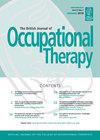What is the occupational impact of myalgic encephalomyelitis/chronic fatigue syndrome for adults living in Australia?
IF 1.3
4区 医学
Q3 REHABILITATION
引用次数: 0
Abstract
Introduction:Occupational recovery for people living with myalgic encephalomyelitis/chronic fatigue syndrome requires better assessment and understanding of the occupational impact of this debilitating condition. This study explores the lived experience of Australian adults with myalgic encephalomyelitis/chronic fatigue syndrome using the Model of Human Occupation.Methods:The research design was a cross-sectional descriptive study, and participants were recruited via social media to complete an online survey. A Model of Human Occupation Tool, The Occupational Self-Assessment, captured an individual’s perceptions of occupational identity and competence.Results:Results were analysed using descriptive statistics and non-parametric tests. The free-text responses were summarised. Twenty-nine participants completed the Occupational Self-Assessment. A decrease in occupational participation across all domains was evident. Qualitative themes of loneliness, feeling confined, feeling like a burden and loss of previous life/roles were collated, showing an adverse impact on occupational identity. A lack of independence and control showed a reduction in occupational competence.Conclusions:The study confirmed the impact of myalgic encephalomyelitis/chronic fatigue syndrome on occupational identity and competence. These individuals struggled with occupational adaptation and would benefit from occupational support. Occupational therapists could use the Occupational Self-Assessment to identify areas of need, set goals and facilitate better occupational adaptation.肌痛性脑脊髓炎/慢性疲劳综合征对澳大利亚成年人的职业影响有多大?
导言:要使患有肌痛性脑脊髓炎/慢性疲劳综合症的人实现职业康复,就必须更好地评估和了解这种使人衰弱的疾病对职业的影响。本研究采用人类职业模型,探讨澳大利亚成年肌痛性脑脊髓炎/慢性疲劳综合征患者的生活经历。研究方法:研究设计为横断面描述性研究,通过社交媒体招募参与者完成在线调查。结果:使用描述性统计和非参数检验对结果进行了分析。对自由文本回答进行了总结。29 名参与者完成了职业自我评估。所有领域的职业参与度都明显下降。收集整理的定性主题包括孤独感、束缚感、负担感和失去以往的生活/角色,显示出对职业认同的不利影响。结论:这项研究证实了肌痛性脑脊髓炎/慢性疲劳综合症对职业认同和职业能力的影响。这些人在职业适应方面遇到困难,将受益于职业支持。职业治疗师可以利用职业自我评估来确定需求领域、设定目标并促进更好的职业适应。
本文章由计算机程序翻译,如有差异,请以英文原文为准。
求助全文
约1分钟内获得全文
求助全文
来源期刊

British Journal of Occupational Therapy
REHABILITATION-
CiteScore
2.20
自引率
15.40%
发文量
81
审稿时长
6-12 weeks
期刊介绍:
British Journal of Occupational Therapy (BJOT) is the official journal of the Royal College of Occupational Therapists. Its purpose is to publish articles with international relevance that advance knowledge in research, practice, education, and management in occupational therapy. It is a monthly peer reviewed publication that disseminates evidence on the effectiveness, benefit, and value of occupational therapy so that occupational therapists, service users, and key stakeholders can make informed decisions. BJOT publishes research articles, reviews, practice analyses, opinion pieces, editorials, letters to the editor and book reviews. It also regularly publishes special issues on topics relevant to occupational therapy.
 求助内容:
求助内容: 应助结果提醒方式:
应助结果提醒方式:


